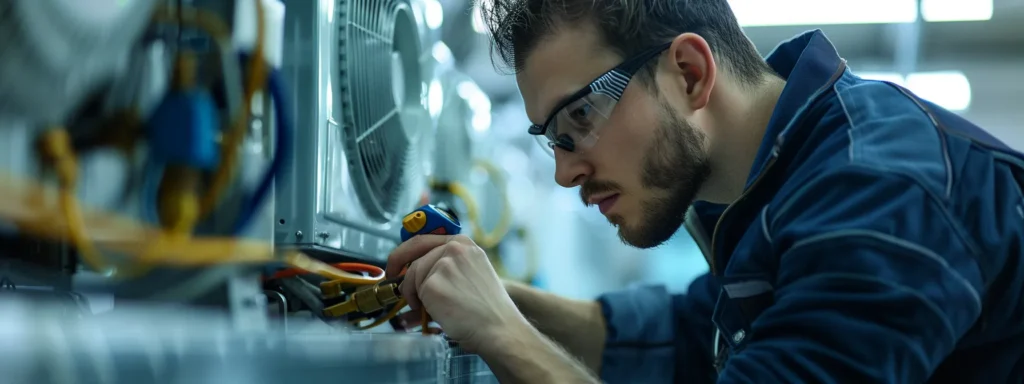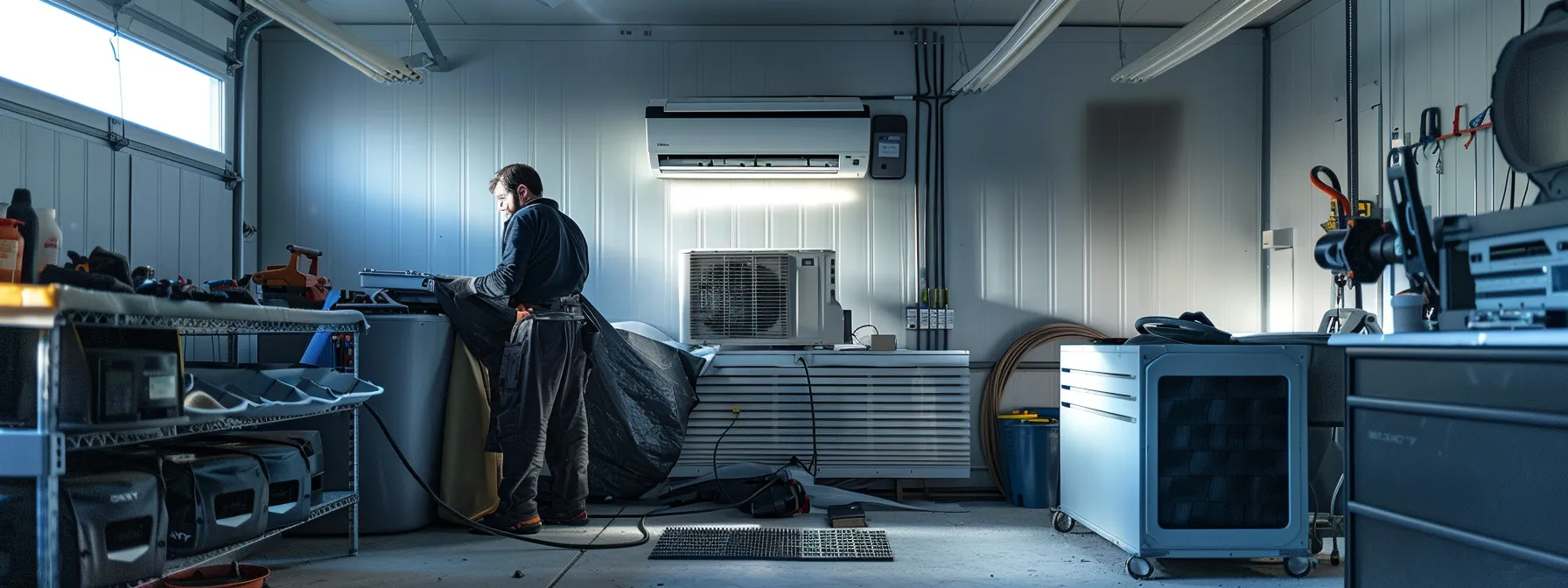Ensure Comfort With Essential Seasonal Maintenance for Your AC

Essential Seasonal Maintenance for Your AC
Is your air conditioner ready for the changing seasons? Regular seasonal maintenance is crucial for keeping your AC running smoothly and efficiently. This guide will cover essential steps for preparing your unit in spring, the best practices for summer upkeep, and tips for fall maintenance. By following these recommendations, homeowners can prevent costly repairs and ensure a comfortable environment year-round. Addressing common issues that arise during seasonal changes will also be discussed, helping readers solve potential problems before they escalate. Let’s keep your AC in top shape!
Understanding Seasonal Air Conditioner Maintenance Needs

Seasonal changes significantly affect air conditioning systems. Understanding how these fluctuations influence performance is essential for identifying common issues, such as refrigerant leaks or duct blockages. Regular maintenance not only prevents problems but also offers benefits like improved air quality, reducing allergens, and ensuring efficient operation for heat pumps and other AC units.
Identifying Seasonal Changes and Their Impact on AC Systems
As seasons change, air conditioning systems face different demands that can influence their efficiency. For instance, high humidity levels in summer can lead to excess moisture, which may cause issues like duct blockages or mold growth. By understanding these environmental factors, homeowners can take proactive steps to prevent wear on their AC units, ensuring reliable performance throughout the year.
Regular seasonal maintenance is crucial for keeping air conditioning systems running smoothly and remaining environmentally friendly. Homeowners can request service to address potential problems early, like refrigerant leaks, which affect both efficiency and air quality. Investing in routine checks not only enhances cooling performance but can also extend the lifespan of the system, reducing the need for costly water heater services or replacements over time.
Assessing Common Problems in Air Conditioners With Seasonal Fluctuations
Seasonal fluctuations can lead to several common issues in air conditioning systems, particularly in heat pumps. For example, a heat pump may struggle to switch between heating and cooling modes as outdoor temperatures vary, leading to inefficiencies. Homeowners should monitor their systems closely for signs of malfunction, such as inconsistent temperatures or unusual noises, and consider scheduling heat pump repair services promptly to address these concerns.
Another common problem linked to seasonal changes involves programmable thermostats. If these devices are not properly set for seasonal adjustments, they may result in either overworking the heating system or insufficient heating during colder months. To mitigate this, homeowners can ensure their thermostats are calibrated correctly and consider regular maintenance checks to maintain system efficiency year-round for both heating and cooling needs.
Learning the Benefits of Regular Maintenance
Regular maintenance plays a vital role in managing humidity levels and ensuring optimal airflow within air conditioning systems. When technicians perform seasonal checks, they can identify and address issues such as dust accumulation, which can hinder performance and lead to decreased efficiency. Homeowners benefit from improved indoor air quality, as routine maintenance helps prevent allergens and contaminants from circulating in their living spaces.
Additionally, timely inspections can prevent leaks that may compromise system pressure and result in higher energy costs. By keeping air conditioning systems well-maintained, homeowners can enjoy reliable cooling while minimizing the risk of unexpected breakdowns, especially during peak usage periods. Engaging in regular upkeep not only promotes system longevity but also provides peace of mind that the HVAC system will perform effectively, regardless of seasonal demands.
As winter fades, the need to prepare air conditioners springs to life. Understanding how to ready your unit now ensures comfort when the heat arrives.
Key Steps for Spring Air Conditioner Preparation

Spring air conditioner preparation involves essential steps for effective HVAC maintenance. Customers should prioritize cleaning or replacing air filters to ensure optimal performance, inspect and clean condenser coils for efficiency, check refrigerant levels appropriately, and ensure proper drainage for moisture control. Each of these actions contributes to the overall functionality and reliability of the system, while also optimizing thermostat settings and protecting the heat exchanger.
Cleaning or Replacing Air Filters for Optimal Performance
Cleaning or replacing air filters is a crucial step in spring air conditioner preparation. Dirty filters can trap dust, dirt, and allergens, which not only impairs airflow but also compromises indoor air quality. This buildup can lead to increased energy consumption for the HVAC system as it works harder to maintain the desired temperature. Regularly addressing filters helps prevent mold growth and reduces strain on the electrical wiring of the air conditioning unit, ultimately enhancing efficiency.
Furthermore, neglecting to maintain air filters can result in significant problems, such as water damage due to improper drainage. When filters are clogged, moisture cannot effectively drain from the system, creating an environment conducive to mold and potential leaks. By prioritizing filter maintenance each spring, homeowners can ensure cleaner air, lower energy bills, and a reduced risk of expensive repairs down the line.
Inspecting and Cleaning Condenser Coils Effectively
Inspecting and cleaning condenser coils is an essential task that improves the efficiency of air conditioning systems. Over time, dust and debris can accumulate on the coils, hindering their ability to dissipate heat effectively. Regular maintenance ensures that the system operates smoothly, reducing the likelihood of emergency repairs due to overheating or inefficient cooling.
During the inspection, technicians should check for any signs of damage or corrosion on the coils, as well as ensuring that the drain is free of blockages to allow proper moisture removal. Homeowners can benefit from pairing routine maintenance with a smart thermostat that optimizes energy use, ensuring the air conditioning unit runs efficiently. This proactive approach to upkeep can help prevent costly breakdowns and maintain reliable performance throughout the hotter months.
Checking Refrigerant Levels Appropriately
Checking refrigerant levels is a vital step in preparing air conditioning systems for the warmer months. Low refrigerant can hinder the system’s ability to effectively cool air, leading to increased energy consumption and discomfort for homeowners. Ensuring the right refrigerant levels not only optimizes air conditioning performance but also prevents potential damage that could necessitate extensive repairs or even replacement of the unit.
Professional technicians recommend regular system maintenance to monitor refrigerant levels as part of comprehensive maintenance plans. Addressing refrigerant issues early can enhance the efficiency of heating and cooling systems, ensuring that the air conditioning unit operates reliably throughout the season. Homeowners should prioritize these checks to maintain comfort levels and prevent unexpected breakdowns that can disrupt daily life.
Ensuring Proper Drainage for Moisture Control
Ensuring proper drainage for air conditioning systems is vital for maintaining indoor air quality and preventing moisture-related issues. During spring maintenance, technicians should inspect drain lines for any blockages caused by debris, which can hinder water flow and create a breeding ground for mold. This proactive step not only protects the system but also enhances the overall comfort of the home, as effective drainage supports heat pumps and other HVAC systems in managing humidity levels.
Homeowners can take simple measures to promote drainage, such as clearing any visible debris from around the outdoor unit and checking the cleanliness of condensate pans. Maintaining proper drainage flows in HVAC systems limits moisture buildup, which can lead to costly repairs over time. Regular HVAC services that include drainage checks can significantly improve air conditioning reliability, ultimately paving the way for a healthier indoor environment.
With spring behind us, the air conditioner now needs care for the heat ahead. Summer brings its own demands, and knowing how to keep your system running smoothly will save you from discomfort and extra costs.
Essential Summer Maintenance Practices

Monitoring system performance during peak usage is essential for maintaining efficient HVAC operation. Regularly checking thermostat accuracy ensures optimal comfort and energy efficiency. Additionally, scheduling professional inspections and tune-ups can identify potential issues early, including lubrication needs and ventilation assessments. Each of these practices enhances reliability and effectiveness, supporting the overall performance of air conditioning systems throughout the summer.
Monitoring System Performance During Peak Usage
Monitoring the HVAC system‘s performance during peak summer usage is crucial for maintaining comfort and efficiency. Homeowners should regularly check for any unusual odors, which could indicate issues like carbon monoxide leaks or complications within the ductwork. Engaging in regular duct cleaning not only helps to improve air quality but also enhances system efficiency, ensuring the HVAC system operates smoothly under increased demand.
It is also essential to verify that the system operates within its warranty guidelines. This involves scheduling professional inspections and tune-ups to assess components that may require lubrication or adjustments. By addressing potential issues early, homeowners can reduce the likelihood of unexpected breakdowns, keeping their cooling systems reliable during the hottest months.
Regularly Checking Thermostat Accuracy
Regularly checking thermostat accuracy is critical for maintaining an efficient air conditioning system during the summer months. As wear and tear accumulate, slight calibration issues can lead to significant temperature discrepancies in the home. Homeowners should schedule routine checks and consider having a professional verify the installation to ensure optimal performance, especially since an inaccurately calibrated thermostat can cause unnecessary energy consumption and discomfort.
In addition to monitoring thermostat settings, attention should also be given to the air filter, as a clogged filter can affect the system’s overall efficiency. During maintenance, homeowners can vacuum the area around the thermostat to eliminate dust and debris that may interfere with its operation. By keeping both the thermostat and air filter in good condition, homeowners can prevent overheating and ensure consistent cooling, ultimately enhancing the comfort of their living spaces.
Scheduling Professional Inspections and Tune-Ups
Scheduling professional inspections and tune-ups for an HVAC system is vital for ensuring optimal performance during the summer. Technicians can assess crucial components such as the condenser and combustion systems to ensure they operate efficiently. Identifying potential issues early can prevent costly repairs and help maintain consistent cooling, which is essential during peak usage periods.
During these professional checks, experts will also evaluate the overall state of the system, including testing for carbon emissions in furnaces where applicable. This thorough HVAC system maintenance not only enhances efficiency but also contributes to a healthier indoor environment by preventing issues related to air quality. By prioritizing these services, homeowners can enjoy peace of mind knowing their cooling systems are ready to handle extreme summer temperatures effectively.
Summer has passed, and the heat eases. Now is the time to prepare your AC for the cool months ahead.
Fall Preparation and Maintenance for Your AC

Preparing the air conditioning system for seasonal changes is essential for maintaining energy efficiency and ensuring longevity. This includes covering the unit to protect against winter elements and checking ductwork for necessary sealing and insulation. Addressing these items with a qualified technician can prevent future issues, enhance performance, and potentially qualify homeowners for energy credits.
Preparing Your System for Seasonal Changes
Preparing the air conditioning system for seasonal changes involves critical steps to ensure optimal performance and minimize energy consumption throughout the colder months. Homeowners should consider covering their outdoor units to protect them from harsh winter elements and prevent potential damage. Additionally, engaging with a qualified technician from On Time Air HVAC for a thorough inspection can help identify any necessary repairs or troubleshooting needed to maintain the system’s longevity.
Another key aspect is checking ductwork for any needed sealing and insulation to prevent heat loss, which can significantly impact energy costs. By addressing these factors during fall maintenance, homeowners can ensure that their HVAC systems operate efficiently when warmer weather returns, reducing the chances of unexpected breakdowns or costly repairs. Taking these proactive measures fosters comfort and reliability for the entire heating system as seasonal demands shift.
Covering Your Unit to Protect Against Winter Elements
Covering an air conditioning unit during the fall is a vital step in preventing corrosion and damage caused by winter elements. A well-fitted cover can shield the unit from snow, ice, and debris, reducing the risks of rust and deterioration that can lead to more extensive air conditioning maintenance issues. Ensuring that the outdoor unit is adequately protected not only extends its lifespan but also enhances the efficiency of air conditioning systems when warm weather returns.
In addition to covering the unit, homeowners should conduct a thorough inspection for any signs of wear, such as cracks in the casing or gas leaks. Preventive measures like these can prevent costly repairs and ensure that the system operates smoothly year-round. By prioritizing proper coverage and completing seasonal air conditioning maintenance, individuals can maintain comfort and efficiency in their homes when the warmer months arrive.
Checking Ductwork for Sealing and Insulation Needs
Checking ductwork for sealing and insulation needs is a crucial part of fall preparation for air conditioning systems. Proper sealing prevents air leaks that can lead to decreased efficiency, causing the HVAC system to work harder than necessary. This can result in higher energy costs and reduced comfort levels in the home, especially during temperature fluctuations when the outdoor unit is less effective.
Engaging qualified HVAC contractors to inspect ductwork ensures any gaps or inadequate insulation are addressed before the winter season. These professionals can also check for potential hazards, such as carbon monoxide leaks from nearby appliances that could compromise indoor air quality. By prioritizing ductwork maintenance, homeowners can significantly enhance system performance and safeguard healthy living environments.
Seasons change, and so do the demands on your HVAC system. Understanding common issues that arise during these transitions can save you time and money, so let’s look at troubleshooting tips next.
Troubleshooting Common Issues During Seasonal Swings

Homeowners should be vigilant in recognizing signs of inefficiency in their air conditioners, such as inconsistent temperatures or unexpected energy bills. Promptly addressing unusual noises and odors is crucial to maintaining system integrity. Understanding when to call a professional can prevent minor issues from escalating into costly repairs. These considerations are essential for effective air conditioner maintenance throughout seasonal changes.
Recognizing Signs of Inefficiency in Your Air Conditioner
Homeowners should be alert to signs of inefficiency in their air conditioning systems, as these indicators may signal underlying issues needing immediate attention. Examples include inconsistent temperatures throughout the home, which can reflect problems with airflow, refrigerant levels, or ductwork. Additionally, unexpected increases in energy bills often accompany these inefficiencies, highlighting the importance of timely maintenance to restore proper function and reduce unnecessary costs.
Another critical aspect to monitor is any unusual noises or smells emerging from the air conditioning unit. Sounds like rattling or buzzing can indicate loose or damaged components, while musty or foul odors may suggest possible mold growth or electrical issues. Recognizing these warning signs early helps homeowners seek professional HVAC service, ensuring efficient operation and prolonging the lifespan of their systems during seasonal fluctuations.
Handling Unusual Noises and Odors Promptly
Homeowners should be attentive to any unusual noises or odors coming from their air conditioning systems, as these can signal underlying problems that require immediate attention. Sounds like grinding or rattling may indicate loose components or mechanical failure, while strange smells could suggest issues such as mold growth or wiring problems. Promptly addressing these concerns not only helps maintain system efficiency but also prevents minor issues from escalating into costly repairs.
When unusual noises or odors are detected, homeowners are advised to shut off the system and inspect it for visible signs of damage or obstruction. If the problem persists, contacting a qualified HVAC technician for a thorough assessment is essential. By responding quickly to these warning signs, homeowners can ensure their air conditioning systems operate smoothly and prolong their lifespan, ultimately providing reliable comfort throughout the changing seasons.
Understanding When to Call a Professional
Homeowners should recognize that certain signs indicate when it is time to call a professional for HVAC service. Issues like inconsistent temperatures, unexplained spikes in energy bills, or unusual noises coming from the air conditioning unit require immediate attention. These problems can often point to underlying issues that could worsen without timely intervention, making it vital to consult an HVAC technician who can diagnose and resolve these concerns effectively.
In many cases, professionals can provide solutions that not only restore the system’s efficiency but also assure a longer lifespan for the equipment. For instance, if a technician identifies refrigerant leaks or duct blockages, they can offer targeted repairs to help maintain optimal performance during seasonal changes. Homeowners benefit from engaging with skilled technicians who ensure that their air conditioning units operate smoothly and reliably.
When problems arise, a simple fix often leads to a greater understanding. Discovering the rewards of regular seasonal maintenance can save time and money, keeping your home comfortable year-round.
Benefits of Consistent Seasonal Maintenance

Consistent seasonal maintenance of air conditioning systems delivers several key benefits, including enhanced energy efficiency and cost savings. Regular upkeep also extends the lifespan of the unit, allowing for longer use without costly replacements. Additionally, proper maintenance improves indoor air quality and overall comfort, creating a healthier living environment for homeowners.
Enhancing Energy Efficiency and Cost Savings
Consistent seasonal maintenance enhances energy efficiency in air conditioning systems, leading to significant cost savings for homeowners. For example, cleaning or replacing air filters prevents dust buildup that can impede airflow, allowing the system to operate more efficiently. When an AC unit runs smoothly, it consumes less energy, which translates into lower utility bills over time.
Moreover, regular inspections by professionals help identify issues such as refrigerant leaks or duct blockages before they escalate. Addressing these problems promptly not only improves the cooling performance but also ensures that the system does not work harder than necessary, further conserving energy. By prioritizing seasonal maintenance, homeowners can enjoy a comfortable living environment while effectively reducing overall heating and cooling costs.
Extending the Lifespan of Your Air Conditioning System
Consistent seasonal maintenance plays a significant role in extending the lifespan of air conditioning systems. Regular checks and upkeep can identify minor issues before they develop into major problems, such as refrigerant leaks or duct blockages. By addressing these concerns promptly, the system operates efficiently, which reduces wear and tear and allows homeowners to enjoy longer service from their HVAC equipment.
For instance, routine inspections by qualified technicians ensure that critical components, such as condenser coils and electrical connections, are in good condition. Keeping these elements well-maintained not only sustains optimal performance but also supports energy efficiency, ultimately leading to fewer breakdowns. Homeowners benefit from a reliable air conditioning system that can serve them well for years, minimizing the need for costly replacements.
Improving Indoor Air Quality and Comfort
Consistent seasonal maintenance of air conditioning systems is crucial for improving indoor air quality. Regularly cleaning or replacing air filters prevents dust and allergens from circulating through the home, minimizing respiratory issues for occupants. By ensuring clear airflow, homeowners can enjoy a more comfortable living environment that supports overall health, making routine maintenance a priority.
Moreover, engaging professional HVAC services to inspect and maintain the system helps identify potential issues such as mold growth or refrigerant leaks. These problems can compromise indoor air quality significantly if left unchecked. By addressing these concerns early through seasonal maintenance, homeowners create a safer and more pleasant atmosphere, allowing their air conditioning systems to function optimally.
Conclusion
Essential seasonal maintenance for air conditioning systems plays a critical role in ensuring efficiency, comfort, and longevity. By routinely addressing tasks like cleaning filters, checking refrigerant levels, and inspecting ductwork, homeowners can prevent costly repairs and enhance indoor air quality. Proactive maintenance not only reduces energy expenses but also keeps systems running smoothly throughout varying weather conditions. Prioritizing these essential tasks safeguards both the HVAC investment and the well-being of residents.